Safiya Robinson on veganism, food JUSTICE and a plant-based Christmas dinner
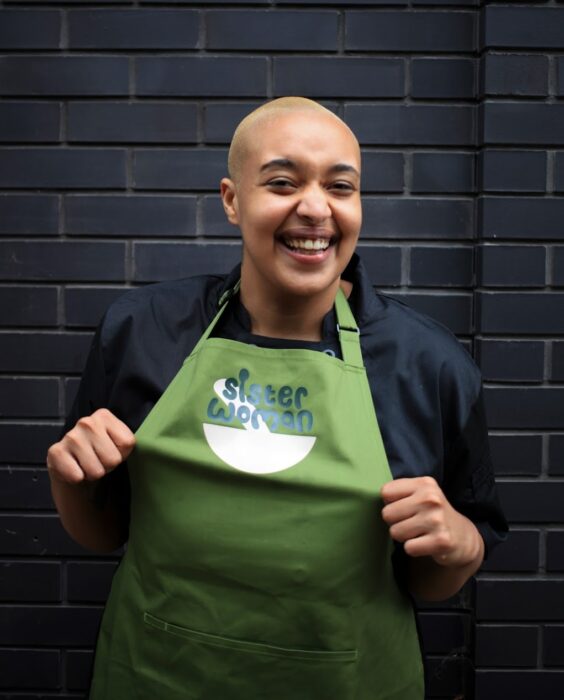
Safiya Robinson is on a mission, a mission to empower us think more critically about food, increase our understanding of its power as a healing tool and to shift our focus from the current trend of just clean eating to food justice and holistic wellness. Safiya is a self-taught cook and through her social enterprise sisterwoman vegan she is educating and creating a community and space for people of colour to explore veganism and wellness.
Here she talks to us about her own health journey, how capitalism has played a part in our disconnect from food and the systems and processes surrounding food production and shares three delicious plant-based recipes to try this Christmas.
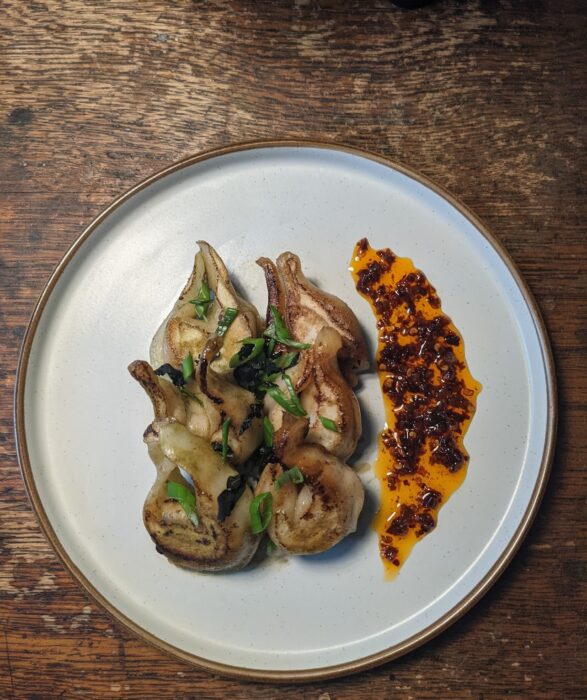
Whether it’s private catering, workshops, events or writing, sisterwoman is all about intentional nourishment. Using plant-based food as the medium, my aim is to support and explore holistic wellness through three tenets: community, education and mindfulness. I started sisterwoman after struggling to see myself reflected in the vegan movement. Wellness spaces can be overwhelmingly white and middle class, and tend to also be quite apolitical. As a Black woman who grew up on free school meals, I know first-hand just how politicised the food space is. There is a Joy James quote that I love that states that “the therapeutic is necessary, but unless you can stop the source of the violence, it’s irrelevant”. I wanted to create a space that was committed to both supporting wellness while also reimagining how we can create a better food world that sits outside of capitalism, white supremacy and patriarchy.
I went vegan in 2014 and I think there has been such amazing growth since then. There’s been great strides in getting corporations to take veganism seriously and in normalising plant-based eating which has definitely made it easier for people to access. However, I wish there was less focus on products – we need plant-based food education, plant-based community shops and kitchens and all-round support in making the transition. I would also love to see some transparency around the benefits of plant-based eating – it is marketed as some sort of miracle cure all, particularly with regards to health and the environment, and I think these conversations could have a lot more nuance. For a lot of us, eating locally grown food would be better for the environment than a vegan diet of imported exotic fruit and processed meat substitutes. Declaring that everyone needs to be vegan, immediately, regardless of individual circumstance is actually quite imperialistic.
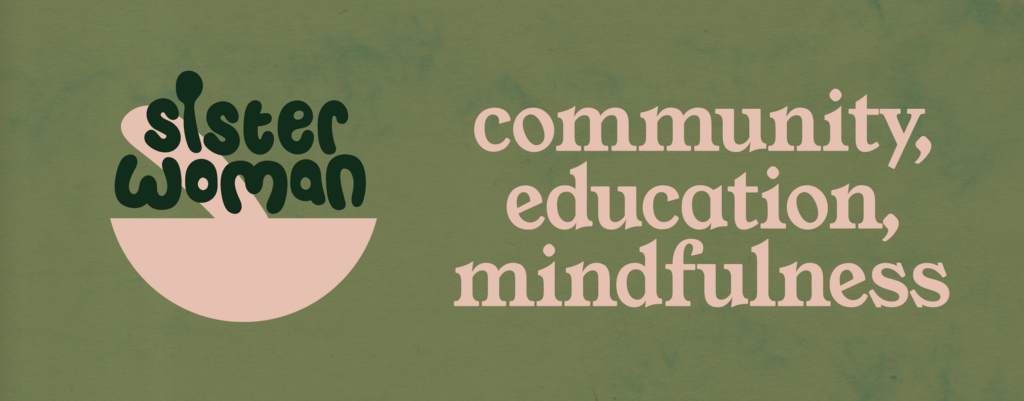
Food is something that we all seemingly take for granted and we have become so far removed from the processes and systems that are involved in getting our food from farm to plate. We tend to have very passive relationships with food, despite it being so key for our survival. Our relationships with food have been disrupted by capitalism, patriarchy and white supremacy; we treat food like a commodity rather than a social need. With sisterwoman, I seek to create spaces for critical conversation about the who, what, where, when and why we eat the food that we eat, and the impact of these seemingly innocuous decisions.
I consider food a tool for healing because it has been my personal practice. I had a really negative relationship with food growing up, and when I transitioned to veganism it was the first time that I felt free to truly explore food and my body. There is an element of mindfulness to eating plant-based, you have to be super intentional and aware of what you’re consuming and where it has come from. This in turn made me think more deeply about what I was consuming across the board. I was diagnosed with bipolar disorder in 2018 and this made me adopt an even more intentional relationship with what I was eating. I discovered the link between your gut health and your mental health and how switching things up nutritionally can make all the difference to your mood.
I was at university when I started to transition to veganism and was the president of the BAME Network, which was focused on anti-racist organising around the campus. I noticed that the conversations were always more fruitful, loving and productive when we had them around a dinner table, with bellies full of nourishing food. Food is so key for establishing community and connection which is an important healing tool. Cooking is another example of mindfulness, and my workshops focus on being grounded, present and having a sense of pride and achievement.
Food justice refers to a grassroots movement that asserts that access to food is a human right. The movement is in response to food insecurity, poor health due to food related illnesses, and protecting the rights of food workers, many of whom are black and brown and are easily exploited. In February 2021 I organised Black Vegan Fest, an online, two-day festival of talks, demos, and workshops designed to support and encourage plant-based eating for the Black community. Check out this incredible convo between myself, Eshe Kiami Zuri and Dee Woods on the topic of food justice and community care.
We need to develop intentional relationships with food and understand it as a social need. Food literally makes up the building blocks of our minds and bodies, yet most of us do not examine the role it plays in our lives or our personal relationships with it. I think this is particularly important for women and other groups who have had these relationships significantly policed.
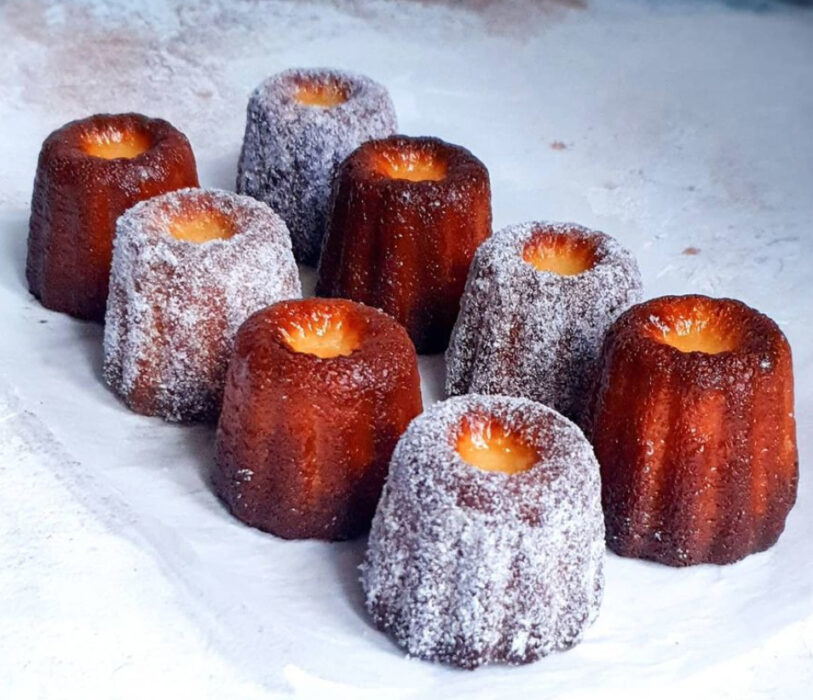
Miso, tahini, hot sauce. Plant-based cooking is all about marinades and sauces and miso and tahini add such depth to my dishes. Hot sauce can always elevate a struggling meal – I keep my fridge stocked with both vinegar-based and Jamaican hot pepper sauces.
Garlic, chickpea flour, mushrooms. I love garlic and can use whole bulbs in some of my dishes so I have to stay stocked! Chickpea flour is really versatile and inexpensive and mushrooms are great for adding texture to dishes.
The little patisseries that you would find at an afternoon tea! So much work and care goes into making them, and they’re usually not overly sweet and have really interesting textures. Baking is a science and an art. I recently went to an Evening Tea event by Yatu’s Bakery, and sipping prosecco and eating delicious chocolate dipped chocolate mousse was the ultimate indulgence!
The little patisseries that you would find at an afternoon tea! So much work and care goes into making them, and they’re usually not overly sweet and have really interesting textures. Baking is a science and an art. I recently went to an Evening Tea event by Yatu’s Bakery, and sipping prosecco and eating delicious chocolate dipped chocolate mousse was the ultimate indulgence!
I think a great tip is to make sure you plan well when buying fresh fruit and veg, not just what you’re going to buy but how you will store it. It’s so important we think about limiting food waste. Fresh herbs make all the difference to simple dishes but can spoil so easily if stored incorrectly! This article is really helpful.
Also, if you have the resources and like to cook creatively I would definitely recommend trying out a veg box delivery. Usually both local and seasonal, these are great time savers and push you to try new things that you’ve never tried. I am now an expert in turnip dishes thanks to a seasonal veg box!
I think I probably use my food processor for 95% of my dishes… I love marinades and sauces and really building flavour, and it is so important for transforming nuts and seeds into different textures, from butters to flours to bases for raw cheesecakes etc.
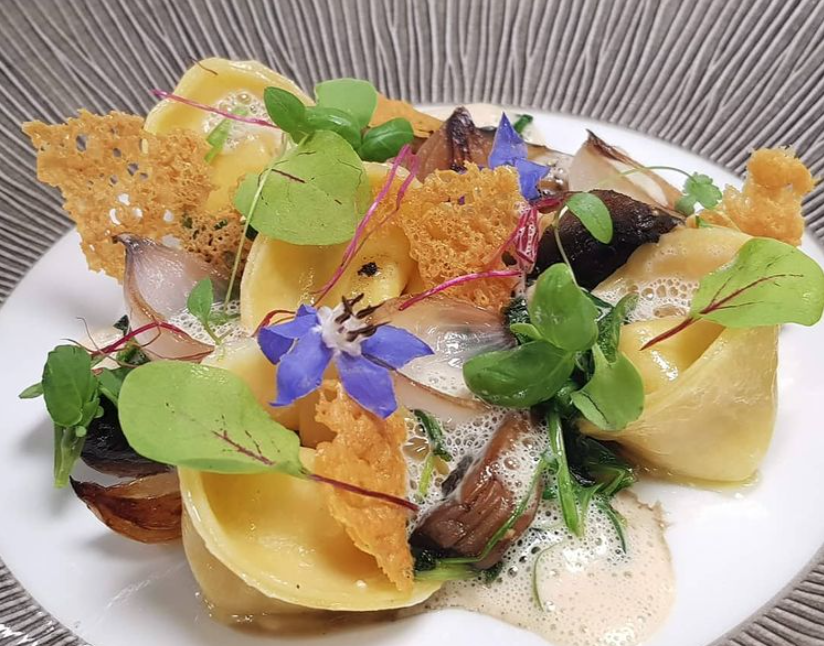
The Future Plate is a collective of African and Caribbean heritage chefs sharing culture through themed tasting menus. I was so impressed with Chef Opeoluwa Odutayo’s main course of pepper soup infused mushroom and jackfruit steak with plantain terrine. The ‘steak’ just melted in your mouth and it was so great to try vegan fine dining with Afro-Caribbean flavours.
Can you give us two restaurant recommendations, your favourite in London and one can be anywhere else in the world?
Blank in Brixton and Sol Sips in New York have perfect plant-based brunches, both Black women owned and with a strong community ethos.
Lockdown definitely got me back into the habit of ordering takeaways! I try to support local rather than chains. I love Bando Belly in Peckham, it’s almost Caribbean/Asian fusion food. I get the chickpea doubles or the shroomi cheesesteak (the gochujang mushrooms are to die for).
I get inspired by so many things! It could be something I’m reading or researching, a feeling I want to recreate, a message I want to communicate. I try to be quite intuitive when I’m developing recipes, I usually don’t measure anything the first time! My friends love it when I’m recipe testing because I will have lots of dinners or randomly text them to come pick up a deconstructed white chocolate cheesecake on their way home from work.
Jessamyn Stanley is an amazing plus size Black female yogi. Her book Every Body Yoga transformed my relationship with yoga and I subscribe to her app The Underbelly for daily flows. I also love Chloe Pierre from thy.self, a platform dedicated to wellness for all.
I’ve got lots of things in the works for 2022! I will be bringing back my Wellness Through Food Programme, a 12-week programme for Black women, and starting a new supper club series in collaboration with some of my favourite London-based collectives. I am also manifesting a publisher for my first book!
I love Christmas dinner with all the trimmings, including brussels sprouts! I also like to add flavours from my African American and Jamaican heritage, such as sorrel (a sweet spicy hibiscus drink) and mac n cheese.
Roasted brussels sprouts, sweet potato and chestnuts
This dish is sweet, smoky and comforting, and much more tasty than the traditional boiled brussels!
Prep time: 15 mins
Cook time: 25 mins
Servings: 4
Ingredients:
2 large sweet potatoes, in small cubes
500g brussels sprouts, trimmed and halved
1/2 cup roasted chestnuts
roughly chopped 1 red onion, diced
1 tbsp smoked paprika
2 tbsp maple syrup
1 tsp garlic powder
6 sage leaves
1 tbsp soy sauce or tamari
1 tbsp coconut oil
drizzle of olive oil
6 cloves of garlic, crushed
pinch sea salt and black pepper
Method:
1. Preheat the oven to 180°C.
2. Combine the smoked paprika, maple syrup, garlic powder, soy sauce, coconut oil, sea salt and black pepper until a paste forms.
3. Rub the sweet potato with the smoked paprika mixture.
4. In a roasting pan add the coated sweet potato, brussels sprouts, red onion, sage and garlic cloves.
5. Add a drizzle of olive oil and mix well. leave to roast for 20-25 minutes, until soft and crispy.
6. Stir in the chestnuts just before serving. make sure they are warmed through (around 2 minutes!
Sorrel
Prep time: 10 mins + overnight
Cook time: 30 mins
Servings: 6
Ingredients:
3⁄4 cup coconut sugar or 5 tbsp agave (add more to taste)
3 inches ginger
2 cups dried sorrel (hibiscus)
6 cups water
1 lime, sliced
1 orange, sliced
10 whole allspice berries
5 cloves
1 cinnamon stick
To serve: ice, water, slice of orange and lime
Method:
1. Blend the ginger, water and sugar
2. In a large pot, combine with all other ingredients and leave to simmer on a very low heat for a minimum of 30 minutes.
3. Leave to cool and place in the fridge for a minimum of 2 hours.
4. Strain the mixture and add to a glass with a slice of orange and lime, some ice, and 1⁄3 cup water.
This goes EXTREMELY well with a shot of rum
Mac n Cheese
Prep time: 30 mins
Cook time: 30 mins
Servings: 6
Ingredients:
500g macaroni white sauce
700ml plant-based milk (I prefer cashew for this recipe, but nut/soy free work too)
1 tsp sweet paprika
1 tsp smoked paprika
1 tsp mixed herbs
1⁄2 tsp mustard (I prefer dijon but any will do)
1 tsp cayenne pepper
1⁄2 tsp nutmeg
3 tbsp flour
3 tbsp vegan butter or oil
sea salt and pepper to taste
1⁄2 tsp turmeric
2 tbsp garlic powder
1 tbsp onion powder
1 cup nutritional yeast (get this from your local health food shop or online)
1tsp sea salt
Choose from smoked paprika, thyme, parsley, nutritional yeast or black pepper.
Preheat the oven to 200C/fan 180C/gas 6.
Method:
Boil the pasta in salted water.
Remove it slightly before packet instructions. You want it to be cooked, but still firm and slightly chewy. Reserve 1⁄2 cup of cooking water.
While the pasta is cooking, start to prepare your white sauce. On a low heat, add your oil or vegan butter in a saucepan, add nutmeg, turmeric, garlic, cayenne, herbs, onion, paprikas, flour and mustard and fry for 30 seconds.
Slowly add milk, stirring or whisking continuously as the sauce thickens. Careful not to let it burn! Season to taste.
Stir in the nutritional yeast.
Keep stirring for about 10 minutes until the sauce is a thick, creamy texture.
Keep 1⁄3 of the sauce aside to top the pasta with.
Drain the pasta, reserving some pasta water, and finish cooking it in the cheese sauce. Add some reserved pasta water and a glug of olive oil if it starts to stick.
Once the pasta is cooked but still firm, transfer to a baking tray and cover with the reserved cheese sauce, a drizzle of olive oil and your chosen garnish. Cover with tinfoil to keep it moist, and bake at 200C.
After 10 minutes remove the foil and bake for a further 10 minutes, or until golden brown.
Follow: @sisterwomanvegan
We've got great things to share!
Sign up for our weekly newsletter
and we'll keep you updated.
You can unsubscribe at any time
Terms & Privacy